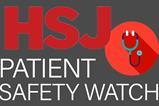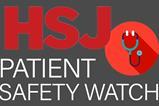HSJ is now hosting the Patient Safety Watch newsletter, written by Patient Safety Watch chief executive James Titcombe.
Good afternoon and welcome to this fortnight’s Patient Safety Watch newsletter.
Patient safety commissioner calls for compensation scheme
In a government-commissioned report, patient safety commissioner Henrietta Hughes has called for a two-stage redress scheme for the thousands of people who have been harmed by valproate or pelvic mesh.
In particular, Dr Hughes has recommended the government start the process with an interim scheme paying £25,000, which is the median amount of compensation she deemed appropriate, in 2025.
Dr Hughes wrote in the report foreword: “The past cannot be changed. But the provision of redress gives the government an opportunity to demonstrate that the concerns of these patients have been heard, listened to and that their needs are being prioritised.”
The announcement comes shortly after figures obtained by HSJ revealed split packs still accounted for more than half of valproate-containing items dispensed in 2022-23. This is despite the Medicines and Healthcare Products Regulatory Agency asking pharmacies in 2018 to dispense valproate-containing medications in their original pack where possible to make sure patients received the manufacturers’ safety warnings.
Times Health Commission calls for ‘no-fault’ compensation system
Following a year-long inquiry, the influential Times Health Commission has published its report. This contained 10 recommendations for the NHS including patient passports, faster mental health treatment for young people and writing off student loans for doctors who stay within the healthcare system. Concerning patient safety, the commission (which I was involved with as a member) also called for introducing a “no-fault” compensation system following avoidable patient harm.
The 2023 Global State of Patient Safety report (commissioned by Patient Safety Watch) featured Japan’s “no fault” maternity compensation scheme as a case study, while both the 2016 Better Births report and the Health and Social Care Select Committee in 2022 have recommended similar schemes.
It’s fair to say the proposal has been met with a mixed response, with some respected voices expressing concern, including Action Against Medical Accidents chief executive Paul Whiteing.
My view? I’ve long felt the current litigation system can act as a barrier to the cultural changes needed to promote better patient safety. I’ve also seen firsthand and through the circumstances of close colleagues and friends how the litigation process can cause significant further damage to those who go through it. A carefully designed alternative, along the lines of that adopted in Japan – which was set up as an alternative to, not a replacement for, the right to litigate – could potentially better meet the needs of harmed patients and families, as well as support a cultural shift towards a less adversarial system that better enables learning.
Litigation reform is a complex and controversial area with many important considerations involved, but discussion and debate are surely a good thing.
In other news this edition…
Maternity services rated ‘inadequate’ as watchdog uncovers multiple concerns
The Care Quality Commission has rated maternity services at Maidstone and Tunbridge Wells Trust’s Tunbridge Wells Hospital “inadequate”, after inspectors uncovered multiple issues, including those related to risk management, governance and oversight of services.
The report also highlighted issues with delays to emergency Caesarean sections and high levels of post-partum haemorrhages.
Inspectors also raised concerns about a lack of reporting of incidents, not only generally but also specifically relating to staff, as the unit “rarely reported maternity red flag staffing incidents” despite having midwife shortages.
Readers of this newsletter will know such problems identified in maternity services are sadly a regular feature. MTW’s issues are the same issues that come up again and again at other trusts and closely mirror concerns that numerous inquiries and reports have previously tried to address.
So what isn’t working and what do we need to do differently?
PHSO and Patient Safety Commissioner join forces to call for ‘fundamental shift in cultures’
Dr Hughes and parliamentary and health service ombudsman Rob Behrens have jointly written to the Department of Health and Social Care permanent secretary Sir Chris Wormald, calling for a “fundamental shift in cultures across the NHS from a combative to a restorative approach”.
Their letter expressed their “concerns regarding what we see as the confrontational culture created by the complaints process in some areas of the NHS that undermines patient safety”, adding: “There are countless oversight bodies involved in holding the NHS to account and scrutinising it when things go wrong. Such scrutiny is essential… But the routes for people to raise a concern need to be simplified and there is an urgent need for a thorough review of the oversight landscape to ensure it is fit for purpose.”
Nursing UCAS applications fall for third year running
The Nursing Times has reported on The Universities and Colleges Admissions Service figures which show 31,100 people applied for nursing courses ahead of the January deadline this year, 7 per cent fewer than the 33,570 who applied in 2023.
Writing to health and social care secretary Victoria Atkins in light of the figures, Royal College of Nursing chief executive and general secretary Pat Cullen warned: “We believe the current situation poses a direct threat to the sustainability of the NHS and patient safety, considering the existing 10.3 per cent vacancy rate in nursing positions within the NHS in England.”
Patient misidentification risks ‘underestimated’ and ‘under-recognised’, warns watchdog
In its latest report, the Health Services Safety Investigations Body has raised several concerns with patient misidentification, including that attempts to reduce the risk had “not been as successful as hoped”, that the risk was “underestimated”, and “under-recognition of the risk is preventing allocation of already limited safety resources to further mitigate the risk”.
The investigators looked at several cases when compiling their report, including one involving a patient who received an invasive procedure not meant for them.
HSSIB senior safety investigator Nick Woodier said: “The evidence we have collected… emphasises that despite national improvement efforts, misidentification remains a persistent safety risk.”
Independent experts appointed to review NMC culture
The Nursing and Midwifery Council has appointed Nazir Afzal and Rise Associates to lead an independent review of its culture, following several concerns raised within the NMC.
In a statement published on the NMC’s website, NMC chief executive and registrar Andrea Sutcliffe said: “We’re here to protect the public, and to do that, every colleague at the NMC needs to feel valued and be supported to deliver our purpose effectively. It’s essential we foster an open, inclusive and high-performing environment in which we all feel able to thrive…
“We welcome this golden opportunity to get to the root of the issues highlighted and make a meaningful and permanent step change that will benefit our colleagues, the professionals on our register and the people we’re here to serve.”
While it’s disappointing to hear about NMC’s ongoing issues, this feels like a strong and decisive approach to addressing the issues in an open and accountable way.
NHS England consulting on potentially abolishing never events list
As reported by HSJ, NHSE is considering overhauling or scrapping the national never events list, which are those incidents meant to be “wholly preventable”. This follows concerns that some incidents on the list have only limited controls to prevent them, with some not wholly preventable and therefore not meeting the strict definition of a never event.
In particular, NHSE acknowledged some current never events – such as wrong site surgery and retained foreign objects – depended on people-focused administrative and behavioural controls, like checklists and limited distractions, and were not “wholly preventable” even with such safeguards in place.
It also noted the current system could damage staff morale, adding: “Some never events under the current definition occur despite the staff involved doing what they are asked to do. However, the signal sent when a never event occurs is that staff failed to do so. This is not consistent with a just culture.”
HSSIB launches work into healthcare safety management systems
Following the publication of its report Safety Management Systems: an Introduction for Healthcare last October, HSSIB has announced two further investigations to “consider how safety management is coordinated and integrated across the healthcare system”.
The work will consider the care pathways for patients requiring multiple contacts across different healthcare settings and will “explore recurring risks when patients receive care from multiple services”.
In light of its first investigation, HSSIB will also consider how NHS staff and patients could be involved in any integrated SMS approach to “gain a better understanding of the pressures and difficulties that NHS staff face when performing safety management activities within and across an [integrated care system]”.
Important work and we will look out for future reports with interest.
Martha’s Rule moves closer to national implementation
The Telegraph has reported that the government is poised to accept a recommendation to grant patients, families and carers “24/7 access to a rapid review from a critical care outreach team” if they are worried about their or their loved one’s condition during a hospital stay. This follows recommendations made by Dr Hughes, after she was asked to review how to introduce Martha’s rule by then health secretary Steve Barclay.
Martha’s rule is named after 13-year-old Martha Mills, who tragically died of sepsis in 2021, after doctors dismissed her parents’ concerns about her worsening condition.
Sharing some good stuff…
Implementing human factors in anaesthesia
This recently published guidance paper makes 12 recommendations for implementing human factors principles in anaesthesia.
This guidance is written for anaesthetists, multidisciplinary teams, clinical and non-clinical managers, hospital chief executives and boards and the leaders of national bodies but will be of relevance and interest to others working in healthcare beyond the anaesthesia speciality.
Too Hot to Handle?
If you are not already familiar with Roger Kline’s work, you should be. His latest report, Too Hot to Handle?, is the result of extensive research, analysis, and consultation with Black and minoritised ethnic staff, and presents a comprehensive overview of both subtle and overt forms of discrimination that can lead to psychological harm when unaddressed or not understood by those in positions of power. It’s essential reading for everyone working in healthcare.
I also strongly recommend this webinar discussion with brap CEO Joy Warmington and Roger himself.
Black Maternal Health Conference UK – 2024
The Motherhood Group has announced the second annual Black Maternal Health Conference UK, this year focusing on “achieving health equity for Black mothers”.
The event will aim to bring together community members, healthcare providers, policy makers and mothers to shine a light on systemic racism in maternity care, address gaps in the current system and clarify the path forward through a series of panels, workshops and open dialogue.
This looks like a fantastic event addressing one of the biggest issues in maternity services. More information about the event and how to book is available here.
That’s all for this edition. Please look out for our next newsletter in two weeks. Until then, thanks for reading and stay safe.
































No comments yet